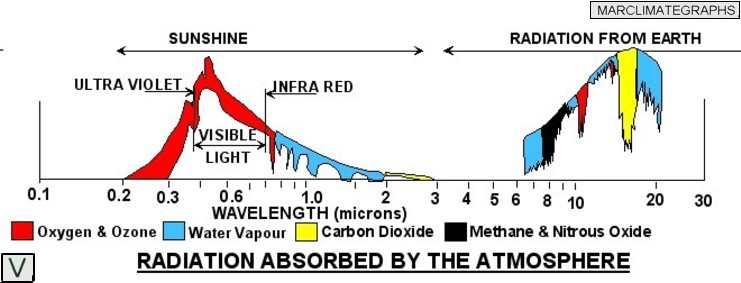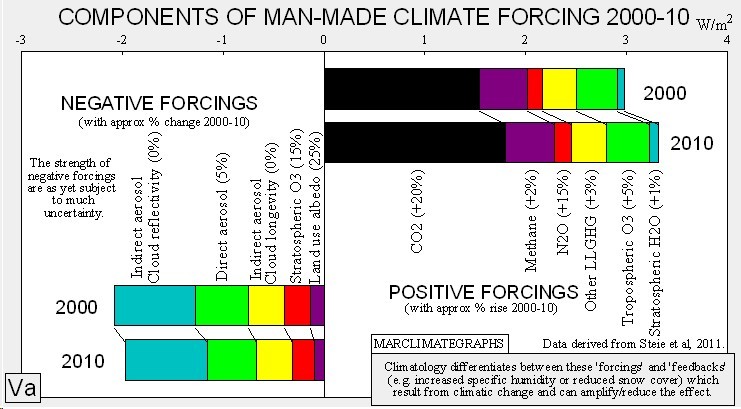This post is part 3 of a series examining the UK-registered educational charity the Global Warming Policy Foundation (GWPF) and the work it allegedly does explaining global warming to the public.
In part 1 the GWPF and its principles (or lack of them) were examined. In part 2 the many serious and fundamental flaws in GWPF Briefing Paper No2 were laid bare. So it will be good if we can find something positive to say about the GWPF here in part 3.
The GWPF Briefing Paper No3 The Truth About Greenhouse Gases examined here is a longer document (all 5,500 words of it) written by “a working scientist” (a physicist to be exact) who tells us he has “a better background than most in the physics of climate.” This sounds good as there is much physics involved in the subject of greenhouse gases, things like the EM spectrum and climate forcings. So on face value, this GWPF Briefing Paper No3 should be a worthwhile read.


WHAT IT‘S REALLY ABOUT
Sadly, the paper actually has very little to say about greenhouse gases. A mere 5% is devoted to CO2 as a greenhouse gas. Other than brief comments about water vapour, the report fails even to mention any of the other greenhouse gases.
Instead the paper devotes 13% of its length to defining safe limits of CO2 for breathing, a further 13% to all that horrid science being done by climatologists, 15% to the oh-so-hard time skeptics have trying to confront this horrid science and 54% explaining how science has been corrupted and truthfulness lost.
So it is ironic that “The Truth About Greenhouse Gases” will not be found in this GWPF Briefing Paper No3.
The paper is authored by Professor William Happer of Princeton University, a member of the GWPF‘s 26-strong Academic Advisory Council.
The GWPF tries to tell us that they embrace the full spectrum of viewpoints on climate but it is safe to say that Happer’s views are extreme. He signed the sceptical Oregon Petition, was a petitioner against the 2007 APS climate change statement, and also testified in 2009 and in 2010 to US government committees. He is an “outright sceptic.”
As Happer is a physicist, the reader may yet still expect the scientific reasoning that lies behind a sceptical viewpoint but even this is absent. Instead the reader is presented with many wise quotes from the likes of Winston Churchill and even Mrs Simpson (that is Wallis not Marge).
THE SCIENCE BIT
Professor Happer does find time to make some comment of a scientific nature. Apparently 50-odd million years ago, when CO2 levels were “several” thousand ppm, “life flourished abundantly.”
It is likely Happer refers to the Paleocene-Eocene Thermal Maximum (PETM) during which mass extinctions occurred in the oceans. On land this was when small mammals discovered that legs were not up to the job so some of them evolved into bats. It would thus be exceedingly difficult to defend Happer’s comment that “life flourished abundantly.”
Happer also tells us that during the Younger-Dryas event 12,000 years ago (a period of rapid climate change), “our human ancestors” survived “just fine.” He gives no source for this assertion, not even a link to findyourancestors.com.
Perhaps his point is that humanity was self-evidently not wiped out by the event. But if this is what he meant, it is not what he said.
IT AIN‘T NO POISON
Strangely for a scientist, Happer makes a very large number of unsupported assertions. He is most keen to stress the benefits brought to plants from a higher CO2 level. He tells us “most green plants evolved at CO2 levels of several thousand ppm.” (Here’s hoping Happer hasn’t overlooked the important C4 grasses that evolved in the last 15 million years when CO2 levels were no higher than today.)
Happer assures the reader that “plants grow better and have better flowers and fruit at higher CO2.” Given his certainty about this, we must pity the researchers struggling to identify these “better flowers and fruit” that global warming will bring (eg Lobell & Field 2007, Tubiello et al 2007, Long et al 2009, Leakey 2009, Nelson et al 2009, etc. Google Scholar provides pagefuls of them). They must all surely be needing some advice from the learned Happer.
And Happer does not ignore the impact of high CO2 on us humans. Because this is important, for once Happer desists from making unsupported assertions and quotes a source. NASA have shown that CO2 concentrations up to 5,000 ppm are safe to breath for a whole 1,000 days. (There is perhaps the additional assumption that you are a grown up and also as fit as an astronaut.)
So Happer pronounces his judgement. Between the levels of 150ppm and 5,000ppm he asserts CO2 is harmless to all living things.
But steady on. What about greenhouse gases?
GREENHOUSE GASES IN A NUTSHELL
In this lengthy document on greenhouse gases, Happer does manage to provide a few lines on CO2 as a greenhouse gas. He tells us a doubling of CO2, all other things remaining equal, will raise global temperatures by “about one degree Celsius” (actually about 1.2 deg C +/-10% ) but he says the climate is not sensitive to such warming as “there is observational evidence that the feedback factor is small and may even be negative.”
Happer fails to mention what this all-important “observational evidence” comprises. Given his assertion contradicts the present scientific consensus, without providing a clue to the nature of his “observational evidence” his words are but wild speculation.
Even so Happer tells us mankind has nothing to fear from increasing CO2. The Earth’s temperature has changed in the past due to a number of factors and “while CO2 is one of these factors, it is seldom the dominant one.”
In saying this, Happer is not ruling out CO2 as the “dominant” factor in climate change. He is simply saying it doesn’t happen very often. A bit like saying it isn’t very often that 1.3 trillion tons of CO2 is emitted into the atmosphere from the burning of coal and oil and natural gas.
THE TRUTH ABOUT “THE TRUTH ABOUT GREENHOUSE GASES”
GWPF Briefing Paper No3 “The Truth About Greenhouse Gases” is a vacuous tirade on a subject the author apparently couldn’t even be bothered to try to understand.
However, before passing a final judgement, there is one subject covered at length within this paper which requires more consideration. As it is a subject raised within other GWPF publications (and elsewhere), the next post in this series shall return to this Briefing Paper to examine it.
Subscribe to our newsletter
Stay up to date with DeSmog news and alerts








